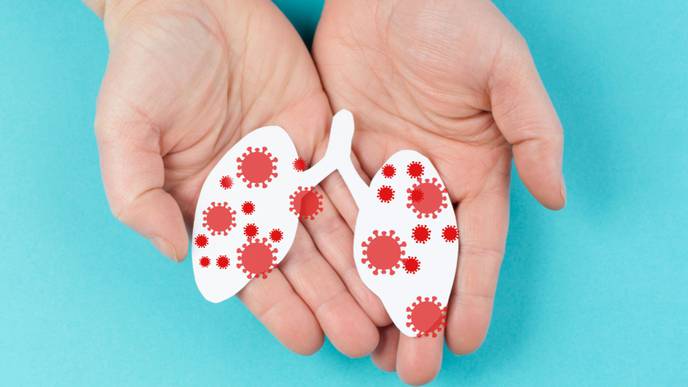Research Makes Important Discovery About Pulmonary Sequelae After COVID-19 Infection

01/04/2024
by MELISA Institute
A collaborative study sought to identify the sequelae associated with long-term pulmonary dysfunction (L-PDD) in patients with COVID-19.
The study was published in Frontiers in Medicine. The research was led by Dr. Estefanía Nova-Lamperti of the Universidad de Concepción, Dr. Gonzalo Labarca of Harvard University, and Mauricio Hernández of MELISA Institute.
During the COVID-19 pandemic, various types of sequelae have been identified in sustained patients recovered from SARS-CoV-2. To refer to this phenomenon, researchers have used the terminology of post-acute COVID-19, post-COVID-19 syndrome or long COVID-19. Likewise, to be classified as such, the symptoms must not be attributable to other causes.
Among the symptoms identified, several pulmonary manifestations have been reported. For example, alteration in computed tomography (CT) scan after infection has been associated with the need for invasive mechanical ventilation during the acute phase of the disease, while a reduction in carbon monoxide diffusion capacity (DLCO) is one of the most reported lung function disturbances six months after COVID-19.
Similarly, severe acute COVID-19 has been associated with an increased risk of long-term pulmonary sequelae, including pulmonary structural abnormalities and impaired O2 diffusion.
Based on this, Dr. Estefanía Nova-Lamperti explained that "the objective of our study was to identify post-COVID-19 pulmonary sequelae, in the short and medium term, in a cohort of Chilean patients prior to the appearance of vaccines on the market, and to determine the inflammatory pathways at the cellular and molecular level, associated with sustained lung failure over time."
The cohort of this study consisted of 60 subjects who had COVID-19 (mild, moderate, or severe) who were evaluated according to the results of their CT scan and DLCOc examination at four months after infection to identify patients with long-term pulmonary dysfunction (L-TPD).
Subsequently, once L-TPD was confirmed, the main parameters supporting this condition were identified during the acute phase of the pathology and four months after infection, in addition to the concomitant long-term consequences at 12 months after COVID-19 infection.
Regarding the methodology of the research, Dr. Gonzalo Labarca indicated that a prospective translational clinical study was carried out in a rather complex time, such as the beginning of the pandemic.
"The focus of the study was to look at the sequelae between the third and fourth month, and after one year after the acute infection. We focused on clinical characteristics such as comorbidities, mental health, physical health, fatigue, cardiopulmonary functions, and an in-depth study of sleep (considering a priori that these systems were going to be significantly altered)."
"Curiously, this was the case, and both for the first evaluation and the one that was done after a year, we found a high percentage of symptoms, in addition to metabolic dysfunction, insulin insufficiency and diabetes that occurred over time, which gave us light on what the sequelae of COVID were in the clinical aspect," he added.
For Mauricio Hernández, Chief Laboratory Officer of MELISA Institute, proteomics was a fundamental tool in carrying out this research, "In our laboratory, we have developed a robust methodology for the massive analysis of serum and plasma, which undoubtedly positions us as one of the research centers with the greatest capacity in Latin America."
"Thanks to this, we were able to obtain valuable information that allowed us to describe, from an immunological and systemic point of view, how the patients evolved over time, which was consistent with the data obtained clinically."
This research concluded that long-term pulmonary dysfunction is associated with advanced age, acute respiratory distress, and the presence of hypertension and insulin resistance.
Regarding these findings, Dr. Nova-Lamperti pointed out that "we realized that patients who maintain lung damage presented a hypoxic state, even up to 12 months after infection, greater systemic inflammation that affected the endothelial barrier, reduction in the phagocytosis response mediated by Fc receptors and increase in metabolic syndrome and insulin resistance."
"That is why individuals with LONG-COVID should have a treatment defined by multidisciplinary teams that seek the gradual recovery of the patient through physical exercise, mental health therapy, and nutritional intervention."
Finally, Dr. Elard Koch, senior researcher and Chairman of MELISA Institute, said that they were pleased with the publication of this study and stressed the importance of the participation of researchers from the staff of the MELISA Institute in research of this type. "For us, it is really gratifying when researchers from our research and biotechnology center participate in research as relevant as this, which is certainly an important goal for our institution," Koch remarked.
More information: Sergio Sanhueza et al, Clinical and pulmonary function analysis in long-COVID revealed that long-term pulmonary dysfunction is associated with vascular inflammation pathways and metabolic syndrome, Frontiers in Medicine (2023). DOI: 10.3389/fmed.2023.1271863
Provided by MELISA Institute
Citation: Research makes important discovery about pulmonary sequelae after COVID-19 infection (2024, January 4) retrieved 4 January 2024 from https://medicalxpress.com/news/2024-01-important-discovery-pulmonary-sequelae-covid.html
This document is subject to copyright. Apart from any fair dealing for the purpose of private study or research, no part may be reproduced without the written permission. The content is provided for information purposes only.

Facebook Comments